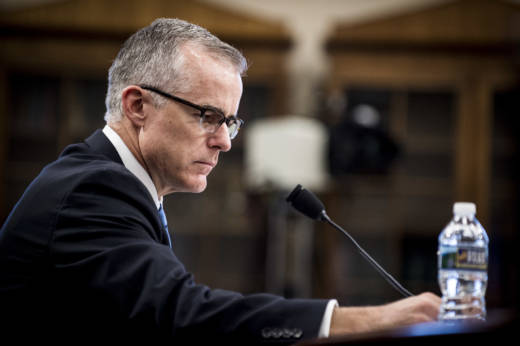Another of the president’s tweets from last year said: “Why didn’t A.G. Sessions replace Acting FBI Director Andrew McCabe, a Comey friend who was in charge of Clinton investigation,” referring to Attorney General Jeff Sessions.
White House spokeswoman Sarah Huckabee Sanders told reporters Monday that Trump was not part of the decision-making process but that he stood by his criticism of McCabe. Amid the tensions, Wray and Deputy Attorney General Rod Rosenstein traveled to the White House Monday to meet with chief of staff John Kelly, according to a senior White House official who was not authorized to discuss the meeting publicly and requested anonymity.
The FBI’s No. 3 official, David Bowdich, has been named acting deputy director.
Though McCabe has pushed back against White House narratives that Comey was not well-liked within the bureau, and that an ongoing FBI investigation into Trump campaign ties to Russia was not a significant matter for the FBI, he has not publicly discussed in detail his interactions with Trump or shared any personal observations of the president.
That could change upon his departure from the FBI. Comey, for instance, after his firing authorized a close friend to share with reporters details of his own encounters with the president that he said troubled him. And former CIA Director John Brennan and James Clapper, the retired director of national intelligence, have been outspoken about their own views of Trump.
McCabe became deputy director in 2016 following earlier jobs running the FBI’s Washington field office and serving as head of its national security branch. A Duke University-educated lawyer, he joined the FBI in 1996 and worked on organized crime in New York.
He took over as acting director following Trump’s May 9 firing of Comey, and was among the officials interviewed for the position, which ultimately went to Wray, a former Justice Department official. The Washington Post reported last week that Trump asked McCabe whom he had voted for in the presidential election. Trump has said he does not recall asking that question.
McCabe’s defenders call him a thoughtful, intelligent and committed career agent.
“FBI Deputy Director Andrew McCabe is, and has been, a dedicated public servant who has served this country well,” former Attorney General Eric Holder tweeted Monday. “Bogus attacks on the FBI and DOJ to distract attention from a legitimate criminal inquiry does long term, unnecessary damage to these foundations of our government.”
Two days after Comey’s firing, McCabe appeared at a congressional hearing and contradicted a White House assertion that Comey had lost the support of FB rank-and-file. He declared, “I can tell you that the majority, the vast majority of FBI employees, enjoyed a deep and positive connection to Director Comey.”
In one of the more dramatic exchanges of the day, he was asked whether the Trump-Russia investigation was a small matter in relation to the other work the FBI is conducting.
“Sir,” he told Sen. Angus King of Maine, “we consider it to be a highly significant investigation.”
Associated Press writers Zeke Miller and Jill Colvin contributed to this report.
